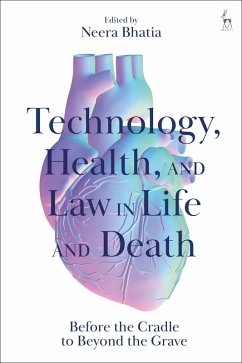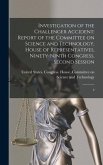Technology, Health, and Law in Life and Death
Before the Cradle to Beyond the Grave
Herausgeber: Bhatia, Neera
Technology, Health, and Law in Life and Death
Before the Cradle to Beyond the Grave
Herausgeber: Bhatia, Neera
- Gebundenes Buch
- Merkliste
- Auf die Merkliste
- Bewerten Bewerten
- Teilen
- Produkt teilen
- Produkterinnerung
- Produkterinnerung
Brings together leading global scholars to examine the legal, ethical, and social implications of biotechnological innovations in healthcare throughout the lifecycle.
Andere Kunden interessierten sich auch für
![Climate Change, Public Health, and the Law Climate Change, Public Health, and the Law]() Climate Change, Public Health, and the Law107,99 €
Climate Change, Public Health, and the Law107,99 €![Military Technology, Armaments Dynamics and Disarmament Military Technology, Armaments Dynamics and Disarmament]() Hans Gunter BrauchMilitary Technology, Armaments Dynamics and Disarmament205,99 €
Hans Gunter BrauchMilitary Technology, Armaments Dynamics and Disarmament205,99 €![The Laws Relating to Public Health, Sanitary- Medical- Protective The Laws Relating to Public Health, Sanitary- Medical- Protective]() Thomas BakerThe Laws Relating to Public Health, Sanitary- Medical- Protective41,99 €
Thomas BakerThe Laws Relating to Public Health, Sanitary- Medical- Protective41,99 €![Investigation of the Challenger Accident: Report of the Committee on Science and Technology, House of Representatives, Ninety-ninth Congress, Second S Investigation of the Challenger Accident: Report of the Committee on Science and Technology, House of Representatives, Ninety-ninth Congress, Second S]() Investigation of the Challenger Accident: Report of the Committee on Science and Technology, House of Representatives, Ninety-ninth Congress, Second S38,99 €
Investigation of the Challenger Accident: Report of the Committee on Science and Technology, House of Representatives, Ninety-ninth Congress, Second S38,99 €![Defining The Moment Of Death Defining The Moment Of Death]() Anamika KrishnanDefining The Moment Of Death30,99 €
Anamika KrishnanDefining The Moment Of Death30,99 €![The Acts for Promoting the Public Health, 1848-1851 The Acts for Promoting the Public Health, 1848-1851]() Cuthbert William JohnsonThe Acts for Promoting the Public Health, 1848-185132,99 €
Cuthbert William JohnsonThe Acts for Promoting the Public Health, 1848-185132,99 €![The Brazen Serpent: Or, Life Coming Through Death The Brazen Serpent: Or, Life Coming Through Death]() Thomas ErskineThe Brazen Serpent: Or, Life Coming Through Death31,99 €
Thomas ErskineThe Brazen Serpent: Or, Life Coming Through Death31,99 €-
-
-
Brings together leading global scholars to examine the legal, ethical, and social implications of biotechnological innovations in healthcare throughout the lifecycle.
Produktdetails
- Produktdetails
- Verlag: Bloomsbury Academic
- Seitenzahl: 208
- Erscheinungstermin: 11. Dezember 2025
- Englisch
- Abmessung: 234mm x 156mm x 25mm
- Gewicht: 454g
- ISBN-13: 9781509978816
- ISBN-10: 150997881X
- Artikelnr.: 74020889
- Herstellerkennzeichnung
- Libri GmbH
- Europaallee 1
- 36244 Bad Hersfeld
- gpsr@libri.de
- Verlag: Bloomsbury Academic
- Seitenzahl: 208
- Erscheinungstermin: 11. Dezember 2025
- Englisch
- Abmessung: 234mm x 156mm x 25mm
- Gewicht: 454g
- ISBN-13: 9781509978816
- ISBN-10: 150997881X
- Artikelnr.: 74020889
- Herstellerkennzeichnung
- Libri GmbH
- Europaallee 1
- 36244 Bad Hersfeld
- gpsr@libri.de
Neera Bhatia is Associate Professor at the School of Law, Deakin University, Australia.
Foreword
Emma Cave (Durham University
UK) Introduction
Neera Bhatia (Deakin University
Australia) Part I: Birth 1. Ectogestation and Reproductive Justice
Zoe L Tongue (University of Leeds
UK) 2. The Sexual and Reproductive Health Revolution of FemTech will not be Sufficiently Regulated: The Current Regulatory Gaps in the Protection of FemTech Users
Manna Mostaghim (London School of Economics
UK) 3. When is a Stem Cell-Based Embryo Model Equivalent to a Natural Human Embryo? Julian Koplin (Monash University
Australia) and Neera Bhatia (Deakin University
Australia) Part II: Life 4. An NHS Medical Devices Information System: Reconciling Patient Safety and Patient Choice?
Jean McHale (University of Birmingham
UK) 5. Parents
Children and Open-source Artificial Pancreas: Morality in the Era of Healthcare Financialisation
Giles Birchley (University of Bristol
UK) 6. Neuroethics
Governance
and the Brain
Nathan Higgins
Stephanie K Slack
John Gardner and Adrian Carter (Monash University
Australia) Part III: Death 7. Life after Death? The Ethical
Legal and Social Implications of Cryonics
Emma Kowal and Neera Bhatia (Deakin University
Australia) 8. New Funerary Methods: Technological Innovation
Sustainability
and the Role of Law
Heather Conway and Gerard Kelly (Queen's University Belfast
UK) 9. The Digital Afterlife: Grieving Digitally After Death
Matthew Groves (Deakin University
Australia) and Prue Vines (University of New South Wales
Australia)
Emma Cave (Durham University
UK) Introduction
Neera Bhatia (Deakin University
Australia) Part I: Birth 1. Ectogestation and Reproductive Justice
Zoe L Tongue (University of Leeds
UK) 2. The Sexual and Reproductive Health Revolution of FemTech will not be Sufficiently Regulated: The Current Regulatory Gaps in the Protection of FemTech Users
Manna Mostaghim (London School of Economics
UK) 3. When is a Stem Cell-Based Embryo Model Equivalent to a Natural Human Embryo? Julian Koplin (Monash University
Australia) and Neera Bhatia (Deakin University
Australia) Part II: Life 4. An NHS Medical Devices Information System: Reconciling Patient Safety and Patient Choice?
Jean McHale (University of Birmingham
UK) 5. Parents
Children and Open-source Artificial Pancreas: Morality in the Era of Healthcare Financialisation
Giles Birchley (University of Bristol
UK) 6. Neuroethics
Governance
and the Brain
Nathan Higgins
Stephanie K Slack
John Gardner and Adrian Carter (Monash University
Australia) Part III: Death 7. Life after Death? The Ethical
Legal and Social Implications of Cryonics
Emma Kowal and Neera Bhatia (Deakin University
Australia) 8. New Funerary Methods: Technological Innovation
Sustainability
and the Role of Law
Heather Conway and Gerard Kelly (Queen's University Belfast
UK) 9. The Digital Afterlife: Grieving Digitally After Death
Matthew Groves (Deakin University
Australia) and Prue Vines (University of New South Wales
Australia)
Foreword
Emma Cave (Durham University
UK) Introduction
Neera Bhatia (Deakin University
Australia) Part I: Birth 1. Ectogestation and Reproductive Justice
Zoe L Tongue (University of Leeds
UK) 2. The Sexual and Reproductive Health Revolution of FemTech will not be Sufficiently Regulated: The Current Regulatory Gaps in the Protection of FemTech Users
Manna Mostaghim (London School of Economics
UK) 3. When is a Stem Cell-Based Embryo Model Equivalent to a Natural Human Embryo? Julian Koplin (Monash University
Australia) and Neera Bhatia (Deakin University
Australia) Part II: Life 4. An NHS Medical Devices Information System: Reconciling Patient Safety and Patient Choice?
Jean McHale (University of Birmingham
UK) 5. Parents
Children and Open-source Artificial Pancreas: Morality in the Era of Healthcare Financialisation
Giles Birchley (University of Bristol
UK) 6. Neuroethics
Governance
and the Brain
Nathan Higgins
Stephanie K Slack
John Gardner and Adrian Carter (Monash University
Australia) Part III: Death 7. Life after Death? The Ethical
Legal and Social Implications of Cryonics
Emma Kowal and Neera Bhatia (Deakin University
Australia) 8. New Funerary Methods: Technological Innovation
Sustainability
and the Role of Law
Heather Conway and Gerard Kelly (Queen's University Belfast
UK) 9. The Digital Afterlife: Grieving Digitally After Death
Matthew Groves (Deakin University
Australia) and Prue Vines (University of New South Wales
Australia)
Emma Cave (Durham University
UK) Introduction
Neera Bhatia (Deakin University
Australia) Part I: Birth 1. Ectogestation and Reproductive Justice
Zoe L Tongue (University of Leeds
UK) 2. The Sexual and Reproductive Health Revolution of FemTech will not be Sufficiently Regulated: The Current Regulatory Gaps in the Protection of FemTech Users
Manna Mostaghim (London School of Economics
UK) 3. When is a Stem Cell-Based Embryo Model Equivalent to a Natural Human Embryo? Julian Koplin (Monash University
Australia) and Neera Bhatia (Deakin University
Australia) Part II: Life 4. An NHS Medical Devices Information System: Reconciling Patient Safety and Patient Choice?
Jean McHale (University of Birmingham
UK) 5. Parents
Children and Open-source Artificial Pancreas: Morality in the Era of Healthcare Financialisation
Giles Birchley (University of Bristol
UK) 6. Neuroethics
Governance
and the Brain
Nathan Higgins
Stephanie K Slack
John Gardner and Adrian Carter (Monash University
Australia) Part III: Death 7. Life after Death? The Ethical
Legal and Social Implications of Cryonics
Emma Kowal and Neera Bhatia (Deakin University
Australia) 8. New Funerary Methods: Technological Innovation
Sustainability
and the Role of Law
Heather Conway and Gerard Kelly (Queen's University Belfast
UK) 9. The Digital Afterlife: Grieving Digitally After Death
Matthew Groves (Deakin University
Australia) and Prue Vines (University of New South Wales
Australia)








